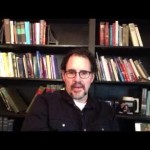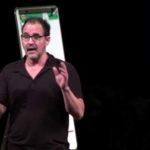We run our website the way we wished the whole internet worked: we provide high quality original content with no ads. We are funded solely by your direct support. Please consider supporting this project.

When Free Will Meets Unfathomable Evil
In the face of tragedy Christians unfortunately tend to recite clichés that attempt to reassure people that, however terrible things seem, everything is unfolding according to God’s mysterious plan. We hear that “God has his reasons”; “God’s ways are not our ways”; “God is still on his throne”; “God doesn’t make mistakes,” and things of this sort. These clichés all reflect what I’ve elsewhere called the “Blueprint Worldview” (see Is God to Blame? and God at War). If this perspective is expressed by a parent whose child has recently been murdered, I would not dream of challenging it. There’s a time and place for everything, and the ministry policy that has served me well for the last thirty years is that whoever is in the grip of a nightmare gets to choose the theology that helps them survive the nightmare.
At the same time, given how pervasive the Blueprint clichés are, and given how often this perspective sooner or later damages people’s relationship with God, it’s encouraging to hear a person express a more coherent and more biblical perspective while in the grips of a nightmare. Robbie Parker is such a person. He is the father of Emilie, one of the precious children murdered last week in Newtown, CT. During the course of an interview with a crowd of reporters, he was asked if he was mad at God for not intervening to prevent the murder of his daughter. He responded by saying this:
————
Mr. Parker reflects the awareness that the question of why God didn’t intervene is not a question about how powerful God is, as it is usually misconstrued. It’s rather a question of what kind of world God decided to create. If God wants a world in which agents are capable of genuine love, it must be a world in which agents possess the free will to choose love or its opposite, for a coerced “love” isn’t a genuine love. And God can’t – not simply won’t – intervene to revoke this free agent’s ability to choose evil, not because God lacks the power to do so, but because if he were to do so, it would simply reveal that God hadn’t really given this agent the free will to choose love or its opposite. In other words, for God to give free will to an agent means the agent has the capacity to chose love or its opposite, which means that free will must be, by definition, irrevocable.
Having this perspective of course doesn’t alleviate the nightmarish pain that Robbie must endure as a result of his beautiful daughter’s untimely death. But it does mean that his pain at least won’t be compounded by the thought that this demonic nightmare was somehow part of God’s plan from the start. Robbie can continue to trust that God in his infinite wisdom has a plan to bring good out of this tragedy, for the infinitely wise God has been anticipating and preparing for this and every other possibility from the foundation of the world, in case this possibility were to unfortunately be actualized. But Robbie can have this confidence without needing to suspect, even for a moment, that God is to blame for the fact that this possibility ended up being actualized. The responsibility for this falls completely on the choices of agents other than God, both human and angelic, beginning with Adam Lanza (and no doubt Satan) in this case.
Every good and perfect gift comes from God (Ja.1:17). To the extent that anything is falls short of this, we can be assured that it comes from some other source.
Category: Q&A
Tags: Current Events, Emilie Parker, Evil, Faith, Free Will, God, Greg Boyd, Grief, Newtown, Problem of Evil, ReKnew, Robbie Parker, Satan, Suffering, Theodicy
Topics: Providence, Predestination and Free Will, The Problem of Evil
Related Reading

Free Will: Are studies that demonstrate genetic determinism a threat to free will?
Greg shares his continuing thoughts on free will with a thought experiment (and a hand-drawn graph!) granting that we are largely determined by forces outside of our control. If we grant this presupposition, does that mean that free will is an illusion or insignificant? Find out!

Sermon Clip: Mark Moore Israel Week 2
In this sermon clip, Mark Moore talks about how God interrupts Abrahams life by asking him to have huge faith. In week two of The Forest In The Trees, Woodland Hills takes a look at the early history of the Hebrew people and the formation of the nation of Israel. Throughout these stories, we see…

Join the Revolution!
We are living at a very important, and very exciting, juncture of history. The old religion of Christendom that has been identified with “Christianity” the last 1600 years is dying, and out of its ruins is arising a new tribe of kingdom revolutionaries. All around the globe people are getting the revelation that the kingdom…

Fundraiser Update
THANK YOU SO MUCH to those of you who have contributed to this ministry. This is such a great start and we’re feeling very grateful! Here’s where we’re at today: 56 monthly supporters $4810 in one-time gifts $2185 monthly budget We’re keeping this fundraiser going through the end of the year and we’re hoping…

Jesus: Our Vision of God
At the beginning of his Gospel John taught that “no one has ever seen God, but the one and only Son, who is himself God and is in closest relationship with the Father, has made him known” (Jn 1:18). He is claiming that, outside of Christ, no one has ever truly known God. In the…

Black Lives Matter, the Police, and Spiritual Warfare
Christ calls us to stand for a different kind of kingdom and this requires that we think in different ways about the violence that is gripping our country. In this short clip from Greg’s sermon this last weekend, we are introduced to a different way. Listen and hear the challenge to understand the deeper reality…
